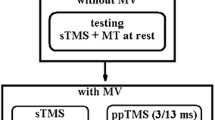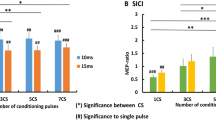Abstract
The technique of repetitive transcranial magnetic stimulation (rTMS) allows cortical motor areas to be activated by trains of magnetic stimuli at different frequencies and intensities. In this paper, we studied long-term neurophysiological effects of rTMS delivered to the motor cortex at 5 Hz with an intensity of 120% of motor threshold. Each stimulus of the train produced muscle-evoked potentials (MEPs) in hand and forearm muscles, which gradually increased in size from the first to the last shock. After the end of the train, the response to a single-test stimulus remained enhanced for 600–900 ms. In contrast, the train had no effect on the size of the MEPs evoked by transcranial electrical stimulation, while it suppressed H-reflexes in forearm muscles for 900 ms. We conclude that rTMS of these parameters increases the excitability of the motor cortex and that this effect outlasts the train for almost 1 s. At the spinal level, rTMS may increase presynaptic inhibition of Ia afferent fibers responsible for the H-reflex.
Similar content being viewed by others
Author information
Authors and Affiliations
Additional information
Received: 12 November 1997 / Accepted: 23 February 1998
Rights and permissions
About this article
Cite this article
Berardelli, A., Inghilleri, M., Rothwell, J. et al. Facilitation of muscle evoked responses after repetitive cortical stimulation in man. Exp Brain Res 122, 79–84 (1998). https://doi.org/10.1007/s002210050493
Issue Date:
DOI: https://doi.org/10.1007/s002210050493




